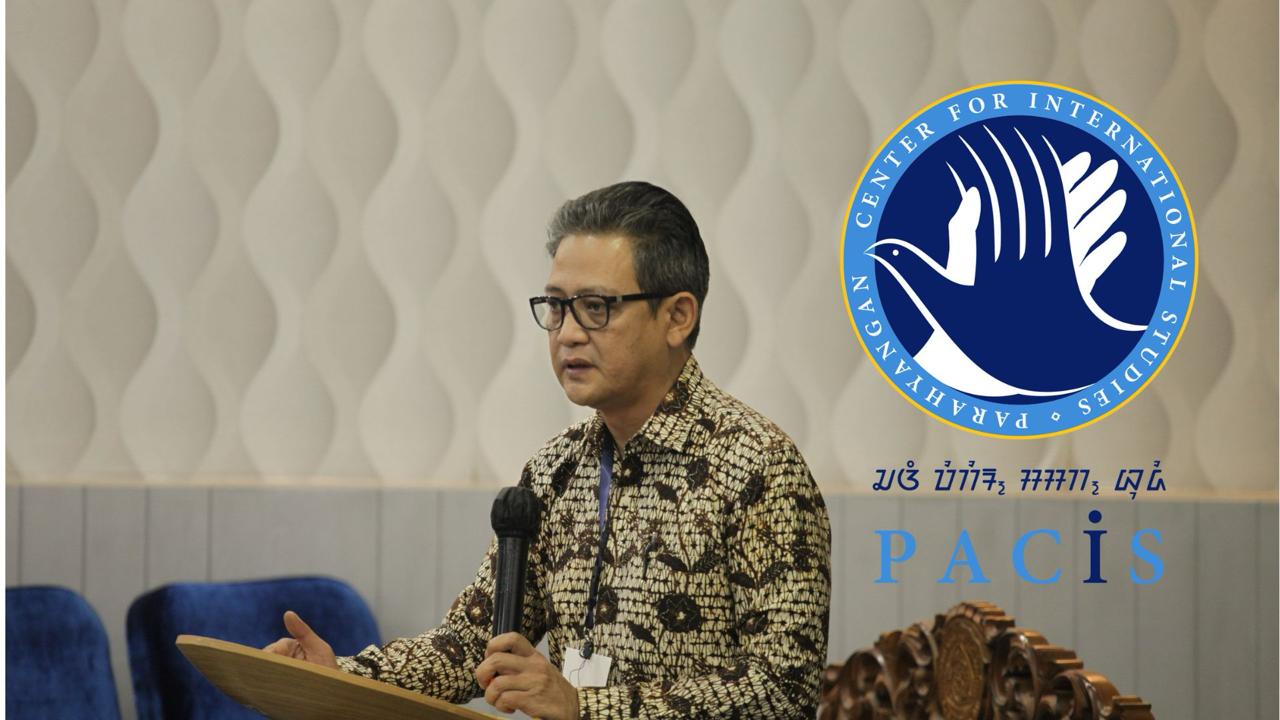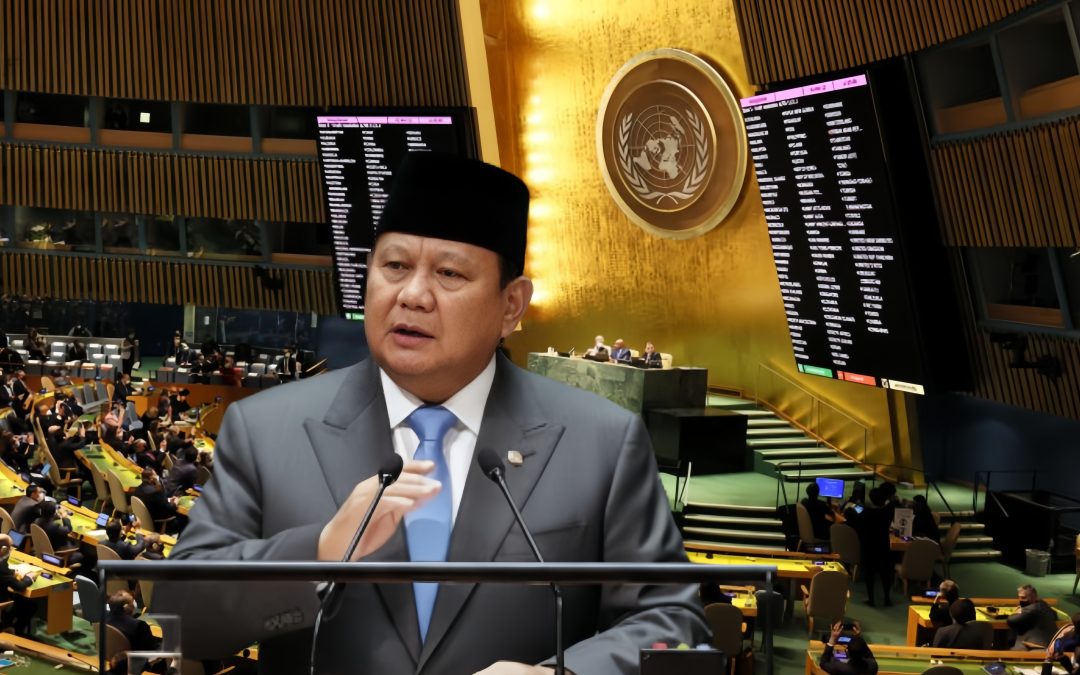The following is an excerpt of speech delivered by Dino R Kusnadi, Senior Diplomat, MOFA RI at ICON-IR 2024
The Relevance of Independent and Active Principle in Today’s Context
I would like to translate into ‘Independent and Active’. Sometimes scholars and journalists write it as ‘Free and Active’, but I think it would be much more proper if we say Independent and Active.
If we remember the context when that was argued by Hatta, it was just not between choosing sides, but it was also a starting point where we declared ourselves to be non-aligned and I think that’s just more important than just not seeing confrontations between anti-Russian or anti-United States, but we declared ourselves to be non-aligned because we carried on the message of decolonization.
We were the first country to actually declare independence two days after the end of World War. We inspired other countries to become independent, it’s right there in the preamble of our constitution. I think it should voice out continuously to defend the voiceless, which Indonesia has constantly been doing, the G20 we voice out the voices of southern countries. During Covid we also garnered international support for developing countries that do not have access to vaccines or medical supplies.
I think, beyond looking into competition, if we focus more into non-aligned itself, where more independent rather than being constricted to one or the other side, would give a better view on what we should do. As a series of grand strategies, this should be realigned and discussed, especially where it’s timely now, when we have a new government.
We should point that–we should discuss this: that the implementation of this orientation could be further scrutinized to be more effective according to the time and needs of today’s people in Indonesia, and also to the aspiration that we should be active on the global stage.
“… the implementation of this orientation could be further scrutinized to be more effective according to the time and needs of today’s people in Indonesia.”
How to Rejuvenate Indonesia’s Foreign Policy
Earlier I responded to the question whether that Independent and Active was still relevant or not, but I tend to see it in a much larger perspective; why not question Indonesia’s foreign policy and see whether it can be rejuvenated. I start off with my angst: my angst is that in the future, the reality will start to look like this movie from twenty years ago; maybe in two hundred or three hundred years, we will go into an ‘idiocracy’ type of government where we take everything for granted. AI made us dumber, we rely on AI to do everything, we rely on populism; social media; and we don’t question anything; simply to make us feel better but we become dumber.
So, this forum is–I think–also an important place to question again, foreign policy ‘Independent and Active’ and see what kind of implementations that we can do. I also have a lot of optimism that we can go beyond individualism, we can go beyond personal economic advantages and have a more egalitarian society, which I’m a huge fan of.
The idea of the future, at least for me, is a Star Trek society. That is where an egalitarian society that cares very little about economic value for the few, but for societal advancement. In this society, you don’t get paid, there’s free food, but you work for the betterment for yourself.
Sure, again, that’s just another idealism, whether that’s true or not, but my point is that in the past five years, the Foreign Ministry has been prioritizing ‘Five’ or ‘Four Plus One’ foreign policy in its implementation, one that is advancing Indonesia’s interests abroad, two: protecting Indonesians abroad, three: protecting the territorial integrity of Indonesia, four: contributing and leading in various multilateral forums. These four points were initially the priorities during the first five years of President Joko Widodo. It was only in the second phase that we have this ‘Plus One’ that includes developing the infrastructure of our diplomatic machinery.
Again the ‘Four Plus One’ implementation is based on the president’s wishes. We implement that into ‘Four Plus One’, but what the moderator was questioning is about a set of strategies or orientation which has always been consistent, but implemented in a pragmatic way of doing things.
I think we have been consistent since 1945 and 1946 to have an independent and active foreign policy as a set of strategies, and of course this set of strategies is based on the idealism of Pancasila and the preamble of our constitution, to which I can quote: “Independence is truly the right of all nations, colonization in the world shall be abolished, participate in the execution of world order and by the virtue of freedom, perpetual peace, and social justice–in the world context.
The point is that, there is a need for us to always be consistent so that we can be regarded as a serious country, and that we uphold these ideals whatever the conditions. But also it depends on the craftsmanship on carrying out that diplomacy. I’ve mentioned before that during the Covid-19, the crucial year of 2020-2021 where even Indonesia is seeking crucial vaccines so that we can have it on a timely basis as soon as possible. Our foreign ministry was thinking “what about other developing countries that do not have access to these vaccines, that we should also think on their behalf?”
Another example is during Indonesia’s presidency in G20 2022, voices from the Global South were ensured to be represented by Indonesia. It’s in our agendas that we always voice out the importance of the Global South apart from our national interests.
So going back, I can argue that Indonesia always remembers that during the forging of the ‘Independent and Active’ foreign policy by Muhammad Hatta 75 years ago, colonial rule was still rampant in that time and that the world was divided between pro-Russian or pro-American. Hatta argued that, and I have to quote “Indonesia’s position should not be a passive party in the arena of international politics, but that it should be an active agent entitled to determine its own standpoint with the right to fight its own goal, and the goal of a fully independent Indonesia.”
Indonesia’s position should not be a passive party in the arena of international politics, but that it should be an active agent entitled to determine its own standpoint with the right to fight its own goal…”
For this, I may have agreed with Michael Leifer and his book “Indonesian Foreign Policy” written in 1993, that Hatta’s statement became the start of Indonesia’s declaration of non-alignment. So again, perhaps when we try to reconsider again Independent and Active, we should take into account that it is deeply rooted inside this; the start of non-alignment, as a crucial part of the birth of the modern world of non-alignment. I think it’s still relevant in the case of two major powers or ‘minilateralism’. It’s giving us enough space to maneuver within our diplomatic craftsmanship, to bring forward Indonesia’s interests and also the interests of the Global South.
Playing More Active Role with Great Impact at Global Stage
Going back, the next is a topic that I want to point out that has not been discussed much, that we are always thinking about–policy and substance. Perhaps in my capacity, in my career as a diplomat for thirty years, trying to see whether we have the budget or not. Lowly Institute global ranking, based on the post that we have and the number of countries, we are only represented in 95 countries out of 201 countries, so that’s less than 50%.
If you want to take a more active role, again being on the ground and meeting with global leaders by representatives, that is what we call debunking in the midst of social media of Twitter, for example, where you only have fragments of statements to the general public, but by meeting directly with global leaders in their capital, and have what we call ‘A1’ type of information to gather more reliable information.
Number two, is that we are also limited by budget. Again, if we are still consistent with Independent and Active and implementing the priorities of ‘4 + 1’ that is within the current budget of the Foreign Ministry in 2023, which is 8.8 trillion Rupiah, with today’s conversion rate, around 515 million USD. Compare that to the American Department of State that reaches the numbers of billions, we can see what’s our maneuvering with that kind of budget. We have around 130 embassies and consulates in less than 100 countries, and with around 1,840 diplomats (out of total 3090 public servants working at MOFA), it’s hard to fulfill the 4+1.
With that kind of budget, we can only do so much, with so little manpower, to deal with global issues, that again will be questioned by our public: whether it is appropriate or not to spend that much on our diplomatic endeavors, where there is also a need for us to develop domestically, using that same money.
Going back, I think if we look where we are going in 2025, if our economy reaches the level as predicted in 2045, of course our interests and needs will increase. It needs to start from now to gradually develop the diplomatic machinery, to fulfill the needs of the people, so that when we grow, it will be justified to fulfill that need. But I think the grand strategy should start from now in growing that diplomatic machinery. Without that, I think whatever policy that we have, it will not be professionally implemented.
“I think the grand strategy should start from now in growing that diplomatic machinery. Without that, I think whatever policy that we have, it will not be professionally implemented.”
Basically that’s my presentation, the last one is just a recap: money follows function. That function is further developed for further diplomatic infrastructure within the whole concept of questioning again the relevance of Independent and Active foreign policy.
Thank you.
(The following is Mr. Dino’s thoughts in responding to the questions from the audience)
Indonesia’s FP Under the Leadership of President-elect Prabowo Subianto
Will the elected president continue on with what President Jokowi has done, and how can he invigorate the style of his foreign policy?
First of all, the question was very pertinent and makes this forum timely because in October 2024 we will have a new government.
Many have speculated that President-elect Prabowo will be more active in geopolitical issues with very proven strong knowledge in the early struggle of the independence of Indonesia and he has a somewhat strategic way of thinking. With you mentioning the ‘Good Neighborhood’ policy, it’s not something new, but it also reflects the cultural aspect of the ‘Asian Way’ that I think was one of the foundations of ASEAN.
With regard to how to develop the diplomatic infrastructure and foreign policy machinery, again, it depends on the phrase saying that “foreign policy is a reflection of domestic policy”. Public diplomacy can bear upon the high cost of our foreign policy, then of course we would be more than happy to do so.
Before I mention the number of diplomatic cities that Indonesia is below 100, but I also forgot to mention that there are 103 foreign diplomatic missions in Jakarta. So that means that there is a minus of 8 countries that do not reciprocate, and I think from a good diplomatic gesture that we should reciprocate those countries that have embassies in Indonesia to their own capital.
Another is that we can attract more countries that are outside of Jakarta but also have the responsibility to cover Jakarta. I noticed in Beijing that there are several African countries hosted but are also accredited to Jakarta, so the contact is through our embassy in Beijing, and that takes a lot of time. Sending in a presidential message congratulating for independence could take two or three months to get the document in the hands of our president. That should be accounted for within the first three to five years just to reciprocate with those countries.
The second phase would be if we do try to open up to non-traditional countries and approach them, especially southern countries, such as Africa and the Middle East where we don’t have a presence, we should start to have a presence there.
“It’s not that we need to have a direct result, the whole point of diplomacy is that we can have a presence first, and still have confidence in those countries.”
It’s not that we need to have a direct result, the whole point of diplomacy is that we can have a presence first, and still have confidence in those countries. Sometimes we are bound by our performance, but sometimes we need to invest first and have the results two, three or five years later on. From the start, account the money that we already have in our budget. So again, the devil is in the details–and again–with every budget, we need to consult with the Ministry of Finance and Bappenas on what we do and what is the result, and that’s part of our transparency to the public that the money that they invest is being well-used.






